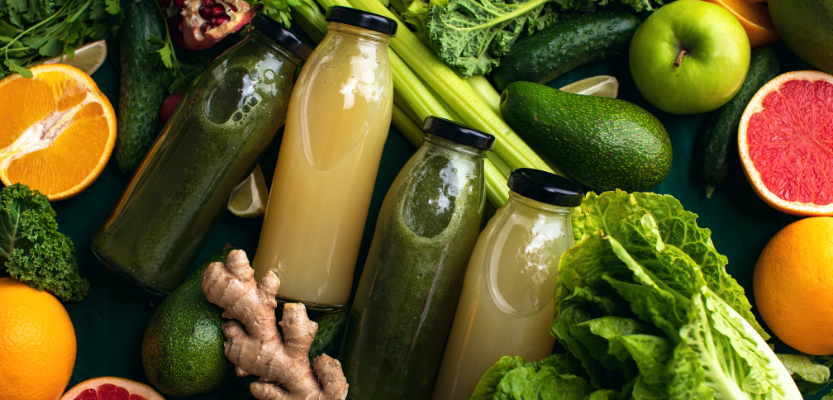Detox diets have gained immense popularity over the years, with promises of quick weight loss, glowing skin, and renewed energy. From juice cleanses to fasting regimens, there seems to be a detox for every health goal. But with all the hype, how do you separate fact from fiction? More importantly, which detox methods actually work?
In this blog, we’ll dive into the truth about detox diets, exploring what works, what doesn’t, and how you can safely and effectively support your body’s natural detoxification processes.
Understanding Detoxification: What Does It Really Mean?
Before we jump into detox diets, it’s important to understand what detoxification actually is. Detoxification is the body’s natural process of eliminating toxins, which are substances that can harm our health. These toxins can come from various sources, including processed foods, environmental pollutants, alcohol, medications, and even the body’s own metabolic waste.
Your body is equipped with several organs that work together to detoxify harmful substances:
- Liver: The liver is the body’s primary detox organ, responsible for filtering and breaking down toxins into less harmful substances that can be excreted.
- Kidneys: The kidneys filter blood, removing waste products and toxins through urine.
- Lungs: The lungs expel carbon dioxide and other volatile compounds from the body through respiration.
- Skin: The skin acts as a barrier, and sweating helps eliminate toxins.
- Digestive System: The digestive system, including the colon, helps expel waste and toxins through bowel movements.
These organs work continuously to keep your body clean and functioning optimally. However, when your body is overwhelmed by toxins, your natural detoxification systems can become less efficient, leading to a buildup of harmful substances. This is where supporting your body’s detoxification processes through diet and lifestyle comes into play.
The Problem with Many Detox Diets
Detox diets often promise dramatic results in a short period of time, but many of these diets are based on misconceptions and can be more harmful than helpful.
1. Extreme Calorie Restriction
Many detox diets involve severe calorie restriction, which can leave you feeling fatigued, irritable, and deprived. While you may lose weight quickly on a restrictive detox diet, this weight loss is often due to muscle loss and water weight rather than fat loss. Extreme calorie restriction can also slow down your metabolism, making it harder to maintain weight loss in the long term.
2. Lack of Nutrients
Some detox diets eliminate entire food groups, leading to nutrient deficiencies. For example, juice cleanses often lack protein and healthy fats, which are essential for maintaining muscle mass, hormone production, and overall health. Long-term nutrient deficiencies can weaken your immune system, reduce energy levels, and even impair cognitive function.
3. Temporary Results
Most detox diets offer only temporary results. While you might feel lighter or more energized during a cleanse, these benefits often fade once you return to your regular eating habits. For lasting health benefits, it’s important to adopt sustainable lifestyle changes rather than relying on short-term detox diets.
Effective Detox Methods That Actually Work
Instead of extreme detox diets, focus on effective methods that support your body’s natural detoxification processes and promote long-term health. Here are some effective strategies to incorporate into your daily routine:
1. Eat a Whole Foods, Plant-Based Diet
A diet rich in whole, unprocessed foods provides your body with the nutrients it needs to detoxify effectively. Focus on including a variety of fruits, vegetables, whole grains, nuts, seeds, and lean proteins in your diet.
- Cruciferous Vegetables: Vegetables like broccoli, cauliflower, Brussels sprouts, and kale contain compounds that support liver detoxification and help eliminate toxins from the body.
- Fiber-Rich Foods: Fiber helps bind to toxins in the digestive tract and promotes regular bowel movements, which are essential for detoxification. Include plenty of fiber-rich foods like beans, lentils, chia seeds, and oats in your diet.
- Antioxidant-Rich Foods: Antioxidants protect your cells from damage caused by toxins. Berries, leafy greens, nuts, and seeds are excellent sources of antioxidants.
2. Stay Hydrated
Water is essential for detoxification. It helps flush toxins out of your body through urine, sweat, and bowel movements. Staying hydrated also supports kidney function and helps maintain the health of your skin and digestive system.
- Tip: Aim to drink at least eight 8-ounce glasses of water daily. If you’re active or live in a hot climate, you may need more. Consider starting your day with a glass of warm water and lemon to support digestion and hydration.
3. Incorporate Regular Physical Activity
Exercise is a powerful way to support detoxification. Physical activity increases circulation, helps flush toxins out through sweat, and supports healthy digestion. It also reduces stress, which can otherwise impair your body’s detoxification processes.
- Tip: Aim for at least 30 minutes of moderate-intensity exercise most days of the week. Activities like walking, cycling, swimming, and yoga are all excellent options. Incorporating strength training exercises can also help build muscle mass and support metabolism.
4. Prioritize Sleep
Sleep is when your body repairs itself and eliminates toxins that have accumulated during the day. Poor sleep can hinder detoxification and lead to a buildup of harmful substances in the body.
- Tip: Aim for 7-9 hours of quality sleep each night. Create a relaxing bedtime routine, avoid screens at least an hour before bed, and ensure your sleeping environment is cool, dark, and quiet.
5. Support Liver Health with Specific Foods and Herbs
The liver is your body’s primary detox organ, so supporting liver health is crucial for effective detoxification.
- Garlic and Onions: These sulfur-containing foods support liver function and help the body detoxify harmful substances.
- Turmeric: Turmeric contains curcumin, a compound with powerful anti-inflammatory and antioxidant properties that support liver health.
- Milk Thistle: Milk thistle is a herb that has been used for centuries to support liver detoxification and regeneration. It’s available as a supplement and can be taken daily to enhance liver function.
6. Minimize Exposure to Environmental Toxins
Reducing your exposure to environmental toxins is just as important as supporting your body’s detoxification processes. By making mindful choices, you can limit the number of toxins your body has to process.
- Choose Organic Produce: Organic fruits and vegetables are grown without synthetic pesticides and herbicides, reducing your exposure to harmful chemicals.
- Use Natural Cleaning Products: Conventional cleaning products often contain harsh chemicals that can be harmful to your health. Opt for natural, non-toxic alternatives instead.
- Avoid Plastic Containers: Plastics, especially those containing BPA and phthalates, can leach harmful chemicals into your food and drinks. Use glass or stainless-steel containers for food storage and avoid microwaving food in plastic.
7. Consider Periodic Fasting
Intermittent fasting is a dietary approach that involves cycling between periods of eating and fasting. It can help support detoxification by giving your digestive system a break and allowing your body to focus on repairing and eliminating toxins.
- Tip: Start with a simple fasting routine, such as the 16/8 method, where you fast for 16 hours and eat during an 8-hour window. During the fasting period, drink water, herbal tea, or black coffee to stay hydrated.
The Power of Sustainable Detoxification
Detoxification is not about quick fixes or extreme diets; it’s about supporting your body’s natural processes in a sustainable and balanced way. By incorporating these effective methods into your daily routine, you can help your body detoxify more effectively, leading to improved energy, better digestion, clearer skin, and enhanced overall well-being.
Remember, every individual’s detoxification needs are unique. If you’re ready to explore personalized strategies for detoxifying your body and achieving optimal health, I invite you to book a complimentary 15-minute discovery call today. You may also reach out via (416) 551-9577 or email ad***@***************ic.com.
Together, we can create a tailored plan that supports your body’s natural detoxification processes and helps you feel your best.

